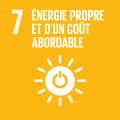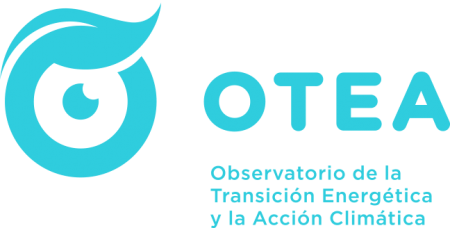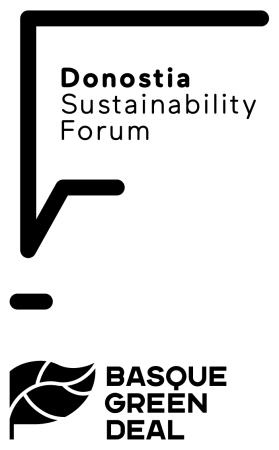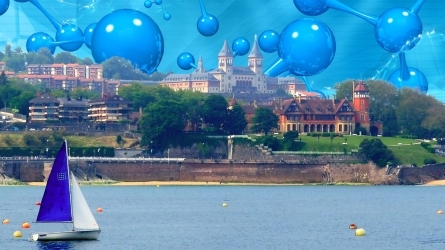
Green Deal: ¿punto de inflexión frente a la crisis climática?
Description
Este Curso de Verano se celebrará de forma presencial y también habrá la posibilidad de participar en directo online a través de ZOOM. Selecciona en el proceso de matrícula cómo vas a participar: presencialmente u online en directo.
Este año el Curso de Verano se centrará en el Green Deal, una potente agenda de reformas de carácter verde y social, y que a raíz de la crisis del coronavirus se pretende desarrollar en muchos países y regiones de todo mundo, entre ellos en la Unión Europea y Estados Unidos. Los paquetes de estímulo y de reformas planteados son los más elevados de la historia reciente, y plantean una gran oportunidad para acelerar la transición energética y poner freno a la crisis climática, pero también numerosos riesgos. Esta edición estará muy marcada por el análisis de cómo estos proyectos para la recuperación y transformación, este nuevo pacto social, pueden marcar un punto de inflexión en la lucha contra la crisis climática en un futuro post-COVID-19.
En la primera jornada se presentará la situación actual en materia política climática a nivel global y se abordarán las implicaciones del cumplimiento del Acuerdo de París a nivel energético, económico y tecnológico. Los retos de la transición energética y ecológica serán analizados desde la visión de las empresas energéticas y las ONG ambientales. Finalmente, los ponentes debatirán sobre las oportunidades que ofrece el Green Deal para la recuperación y la transformación económica y social.
En la segunda jornada se abordará la transición energética desde una perspectiva social, poniendo énfasis en las implicaciones en términos de empleo y transición justa, así como en su dimensión política e institucional. También, abordaremos las innovaciones sociales que serán necesarias para avanzar en esta transición. Finalmente, las y los ponentes debatirán sobre lo aprendido en la crisis del coronavirus para abordar mejor y a tiempo la crisis climática.
El Curso de Verano contará, además, con un evento abierto a toda la sociedad. Este evento contará con la participación de personas que desde el País Vasco han sido testigos de transformaciones sociales, económicas, energéticas o industriales en el pasado, y cuya experiencia puede ayudarnos a entender cómo abordar mejor los cambios y transformaciones que se avecinan.
Objectives
.
Activity directed to
- University students
- Students not from university
- Teachers
- Professionals
- All public
- Tomadores de decisiones y otros grupos de interés que abordan el cambio climático
Program
09-09-2021
Institutional Opening session
- Arantxa Tapia Otaegi Eusko Jaurlaritza - Gobierno Vasco - Consejera de Desarrollo Económico, Sostenibilidad y Medio Ambiente
- María José Sanz Sánchez BC3, Basque Centre for Climate Change - Directora Científica
- Itziar Alkorta Idiakez UPV/EHU - Directora de los Cursos de Verano
“Gobernanza climática y Acuerdo de París: rumbo a la COP26 en Glasgow“
- Lara Esther Lazaro Touza Real Instituto Elcano - Investigadora principal
“¿Es viable desde un punto de vista tecnológico descarbonizar la economía global?“
- Pedro Linares Llamas Universidad P. Comillas - Profesor
Break
“Descarbonización del sector energético europeo a 2050: la senda económica óptima y sus oportunidades“
- Gonzalo Saenz de Miera Iberdrola - Director de Cambio Climático
“¿Transición energética o transición ecológica? Sobre el concepto y necesidad de renovables responsables“
- Asunción Ruiz Guijosa SEO Birdlife - Directora Ejecutiva
Round table: “El Pacto Verde Europeo y la transición energética: oportunidades y riesgos para la recuperación económica“
- Antxon Olabe (Moderator)
- Pedro Linares Llamas Universidad P. Comillas - Profesor
- Gonzalo Saenz de Miera Iberdrola - Director de Cambio Climático
- Lara Esther Lazaro Touza Real Instituto Elcano - Investigador Senior
- Asunción Ruiz Guijosa SEO Birdlife - Directora Ejecutiva
Round table: “¿Qué hemos aprendido de las reconversiones y transformaciones ocurridas en el País Vasco para afrontar mejor la transición hacia la sostenibilidad?“
- Victor Viñuales ECODES - Director Ejecutivo (Moderator)
- Juan José Ibarretxe Markuartu Agirre Lehendakaria Center - Presidente Fundación
- Cristina Oyón Echeverria SPRI, Agencia vasca de desarrollo empresarial - Directora de Tecnología, Innovación y Sostenibilidad
- Jose Ignacio Hormaeche Cluster de Energía del País Vasco (Basque Energy Cluster) - Director General
- Sara de la Rica Goiricelaya Universidad del País Vasco (EHU/UPV) e ISEAK - Catedrática de la UPV/EHU y Directora de la Fundación ISEAK
10-09-2021
Presentation by the Director of the activity
- Iñaki Arto BC3, Basque Centre for Climate Change - Investigador Senior
“Transición justa y empleo: la dimensión sociolaboral de la acción climática“
- Joaquín Nieto Sáinz OIT, Organización Internacional del Trabajo - Director de la Oficina de la OIT para España
“Impacto social de la política climática: el caso del impuesto al diésel “
- Xaquín García-Muros BC3, Basque Centre for Climate Change - Investigador postdoctoral
Break
“Los retos de la transición ecológica desde el punto de vista de la gobernanza institucional “
- Juan José Álvarez Rubio Universidad del País Vasco (EHU/UPV) y Globernance - Catedrático Derecho Internacional Privado
“Green Deal: la (última?) oportunidad para las democracias“
- Cristina Monge Lasierra Universidad de Zaragoza, Globernance, ItdUPM y BC3, Basque Centre for Climate Change - Profesora, investigadora
Round table: “¿Qué hemos aprendido de la crisis del coronavirus para abordar mejor la crisis climática?“
- Iñaki Arto BC3, Basque Centre for Climate Change - Investigador Senior (Moderator)
- Xaquín García-Muros BC3, Basque Centre for Climate Change - Investigador postdoctoral
- Joaquín Nieto Sáinz OIT, Organización Internacional del Trabajo - Director de la Oficina de la OIT para España
- Juan José Álvarez Rubio Universidad del País Vasco (EHU/UPV) y Globernance - Catedrático Derecho Internacional Privado
- Cristina Monge Lasierra Universidad de Zaragoza, Globernance, ItdUPM y BC3, Basque Centre for Climate Change - Profesora, investigadora
Closing session
- Mikel González Ruiz Eguino BC3, Basque Centre for Climate Change - Investigador Senior
Directors
Senior researcher at BC3 (Basque Centre for Climate Change) and associated professor at the University of the Basque Country. He has a PhD in Economics (2006, University of the Basque Country) and a degree in Engineering (2001, University of Deusto). He has been visiting scholar at Wageningen University (Netherlands) and Universidad Iberoamericana (Mexico). His main interests lie in the fields of energy and climate change economics. He is also interested in providing scientific support for decision making in the transition to a low-carbon, sustainable economy. His work has been published the leading journals in the field. He has worked for Basque and Spanish institutions and also lead several scientific projects funded by the European Commission. His doctoral thesis won him the Enrique Fuentes Quintana prize (FUNCAS, 2006). Since 2012 he has been the coordinator of the Low Carbon research line at BC3. He is currently vicepresident of the Spanish Association for Energy Economics (AEEE).
Prof. Sanz holds a Ph.D. in Biological Sciences from the Universidad de Valencia (1991) and has expertise in several scientific areas like Ecophysiology, Air pollution effects, lower and higher plants, Atmospheric dynamics and chemistry, Nitrogen and carbon cycles, Greenhouse Gasses and other related gases, Greenhouse gas inventories, LULUCF and REDD+. She has been strongly involved in the policy dimension of Climate Change, guiding political decisions carried out at centres such as the FAO (United Nations Food and Agriculture Organisation) or the UNFCCC (United Nations Framework Convention on Climate Change). She has an expertise on multilateral processes, regulatory frameworks, policy measures and instruments of Climate Change Policy, and led the implementation of different programmes with a multidisciplinary-based approach.
Speakers
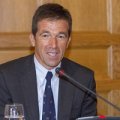
Juan José Álvarez Rubio
UPV/EHU, Catedrático Derecho internacional privado
Juan José Álvarez Rubio is Professor of Private International Law at the UPV / EHU and co-founder and Secretary of GLOBERNANCE (Institute for Democratic Governance). He was Secretary General of the Basque Council of the European Movement (EUROBASK / CVME) (May 2003-2012) and currently continues to exercise his function as an expert for the EUROPEAN COMMISSION (General Directorate of Justice, Freedom and Security), on December 17, 2007, for the areas of Civil Justice, borders, protection of personal data and security areas. His lines of research focus on Migration Law and Private International Law, Maritime Law, International Trade Law and Human Rights, European Law and areas related to internal conflicts. He is the author of numerous scientific publications and leads the UPV / EHU's consolidated group of international law as IP. In 2015 he received the Eusko-ikaskuntza-Laboral Kutxa Award for Humanities, Culture, Arts and Social Sciences.

Iñaki Arto
BC3. Basque Centre for Climate Change
PhD in Economics, Master in Engineering (Environmental Technology and Management) and Degree in Economics. He is currently a research professor at the Basque Centre for Climate Change (BC3), which he joined in 2013. He has previously held research positions at the Joint Research Centre of the European Commission (2010-2013) and the University of the Basque Country UPV/EHU (2001-2010). His research focuses on the analysis of the social, economic and environmental implications of the transition to a low-carbon economy. He has published more than 130 technical and scientific papers including 60 articles in scientific journals, 4 books, 17 book chapters and more than 50 scientific reports. He has also been a consultant to several institutions such as the Food and Agriculture Organization of the United Nations (FAO), the World Bank, the World Health Organization and the European Commission, among others.
Sara de la Rica, is Professor of Economics at the University of the Basque Country (UPV-EHU) and since its constitution in 2018, Director of the ISEAK Foundation. His area of specialty is the Labor Market, and in particular, labor inequalities caused by socioeconomic factors, sex, origin or age. She also deals with the analysis of poverty and the challenges of digitalization, and currently holds other positions such as Member of the Board of Iberdrola, Associate Researcher at IZA (Institute of Labor Economics) and Member of the Reflection Forum of AMETIC (Multisectorial Association of Spanish Electronics and Communications Companies). In 2018 Sara received the Award for «Basque Economist 2018, Ekonomistak Saria 2018«, awarded by the Basque College of Economists.

Xaquín García-Muros
BC3. Basque Centre for Climate Change
Xaquín holds a PhD in Economics from the University of the Basque Country and a degree in Economics (University of Alcalá, 2011). The main objective of his thesis dissertation was to explore the distributional implications of environmental protection policies. He has undertaken scientific stays in Universities of Germany (Oldenburg University) and Spain (University Rey Juan Carlos I). Despite Xaquin is a young researcher, he has been already quite active with publications in peer-reviewed international field journals and presentation in many of the main international congresses. His doctoral thesis won him the Enrique Fuentes Quintana prize (FUNCAS, 2018). Recently, Xaquin has been awarded with a Marie-Curie Global Fellowships for a two-year stay at the Massachusetts Institute of Technology (MIT). His main research interest is to create and spread knowledge in the field of energy, climate change and public economics and the distributional impacts of climate change mitigation policies.
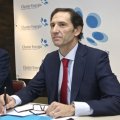
Jose Ignacio Hormaeche
Cluster de Energía del País Vasco
Jose Ignacio Hormaeche, is a Civil, Hydraulic and Energetic, Engineer. He is currently the General Director of the Energy Cluster of the Basque Country. The Energy Cluster Association (ACE) is a non-profit association established at the end of 1996 within the framework of the Basque Government's policy to promote the competitiveness of the industrial fabric. It currently integrates 172 companies and entities: energy operators, equipment and component manufacturers, engineering companies, service companies, as well as agents of the Basque Science, Technology and Innovation Network and public agencies of the Basque Government. competitiveness of the Basque energy sector, with special attention to SMEs, through inter-business cooperation and public-private collaboration. Previously, José Ignacio has been Director of Operations of Gamesa and General Director of EVE (Basque Energy Agency), among others.

Juan José Ibarretxe Markuartu
Agirre Lehendakaria Center
He was Lehendakari (President) of the Autonomous Community of the Basque Country between 1999 and 2009. He graduated in Economics and has completed his doctoral thesis: ethical principle, democratic and sustainable principle of human development: bases of a democratic model. Since March 2013, he has directed the Agirre Lehendakaria Center for Social and Political Studies. He has been a visiting professor for 9 courses at the Interamerican University of Puerto Rico. He has also been the director of the research project in collaboration with Columbia University in New York, George Mason University in Washington and Euclid University in London, "The Basque Case: a Comprehensive Model for Sustainable Human Development". Honoris Causa was appointed doctor by the University of Rosario, National University of La Plata, Public University "Ivane Javakhishvili Tbilisi", University of Córdoba, Autonomous University of Santo Domingo and Inter-American University of Puerto Rico.

Lara Esther Lazaro Touza
Real Instituto Elcano
Lara Lázaro is a principal investigator at the Elcano Royal Institute and a professor of Economic Theory at the Cardenal Cisneros Higher Education Center (attached to the Complutense University of Madrid). PhD from the London School of Economics and Political Science (LSE) and Master in Environmental Assessment and Evaluation, also from the LSE. She also has a degree in Economics from the Autonomous University of Madrid. She has been a researcher at the Real Instituto Elcano's Energy and Climate Change Program (2009-2011), and previously worked at the LSE as a Postdoctoral Fellow and at Bloomberg. She has been the director of the Master in Environmental Management at the Instituto de Empresa, in which she has also taught classes on environmental policy and decision-making processes. As a consultant, she has worked for Abengoa Research on a project on the “Energy Transition and Climate Change”, as well as for the Repsol Technology Center in the HEREDERA project.
Pedro Linares is Professor of Industrial Engineering at the ICAI School of Engineering and co-founder and Director of Economics for Energy. He is also research affiliate at the Institute for Technology Research (IIT) and the BP Chair on Energy and Sustainability, and Research Associate at MIT-CEEPR. He currently serves as Vice-Rector for Research and International Affairs at Comillas Pontifical University, Madrid. He holds a M.S. and Ph.D. in Agricultural Economics from U. Politécnica, Madrid. His research focuses on the relationship between energy, economics and environment, and specifically on sustainable energy, renewable energy and environmental policy, and multicriteria methods applied to resource allocation. He has published about these issues in the major journals in the field. He has also been a consultant for several private and public institutions in Spain, Europe and Latin America. He has more than 20 years experience in working with public institutions.

Cristina Monge Lasierra
Universidad de Zaragoza, Globernance, ItdUPM y BC3
Cristina Monge is a political scientist, professor of sociology at the University of Zaragoza, advisor to Ecodes and senior advisor to LlyC. Her areas of interest are sustainability and democratic quality, and especially governance for the ecological transition, an issue she is working on in research centers such as Globernance, BC3 and itdUPM. She is the author of 15M: A political movement to democratize society (2017), and co-author of Hackear la Política (2018), and The Social Initiative for Mediation of Water Conflicts in Aragon (2019). In addition, she is co-editor of the collection More Political Culture, More Democracy, and political analyst for El País, Cadena SER, Infolibre, and RTVE.
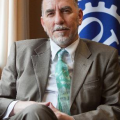
Joaquín Nieto Sáinz
OIT
He has been Director of the ILO since 2011. Previously, he was the Confederal Secretary for Occupational Health, Environment and Occupational Health of the Workers' Commissions, co-founder and president of ISTAS, SUSTAINLABOUR and the Governing Council of the University's Labor, Environment and Health Chair Polytechnic of Madrid. Represented workers at the European Commission Environment Forum, the United Nations Commission for Sustainable Development, UNEP and climate summits. He received the award for his personal trajectory in defense of the Earth in 2002, Via APIA from the Association of Environmental Information Journalists in 2003 and the National Award April 28 for the Prevention of Occupational Risks (2009). Author of the book ‘The Challenges of Climate Change’ and internationally recognized for his pioneering work in incorporating the environmental dimension to the union agenda, the labor dimension to the environmental agenda, and the just transition to the climate agenda.
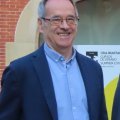
Antxon Olabe
Antxon Olabe, has been part of the Cabinet of the Fourth Vice President and Minister for Ecological Transition as an advisor on climate change and energy transition (July 2018 December 2020). Throughout that time, he has co-directed and coordinated the team in charge of the elaboration of the Integrated National Energy and Climate Plan 2021-2030 that the Government has presented to the European Commission, as well as the team in charge of the elaboration of the Long-term decarbonization strategy, 2050, delivered to the European Commission and the United Nations (under the Paris Agreement). He is the author of the book "Climate-environmental crisis. The time of responsibility" 2016 editorial Galaxia Gutenberg and has published 27 essays on climate change in media such as the Elcano Royal Institute, Foreign Policy, KEYS of practical reason. He has been Visiting Scholar at the Universities of Green Bay and St Norbert College (Wisconsin, United States).

Cristina Oyón Echeverria
SPRI
Cristina Oyon is Director of Technology, Innovation and Sustainability at SPRI (www.spri.eus), the Business Development Agency of the Basque Country. She is in charge of the design, implementation, communication, monitoring and evaluation of technology and business development strategies within the framework of regional competitiveness policies, including the RIS3 Smart Specialization Regional Strategy. She has a degree in Physics from the University of the Basque Country UPV / EHU. She was a member of the High Level Industrial Roundtable 'Industry 2030' of the European Commission and has recently been appointed a member of the Industrial Forum, which will support the European Commission in its analysis of the different industrial ecosystems and will assess the risks and industry needs in the double sustainable and digital transition. Leads the group of experts Women in Manufacturing of the World Manufacturing Forum.
Asunción Ruiz Guijosa
SEO-Birdlife
Asun Ruiz, has a degree in Biological Sciences from the Autonomous University of Madrid (UAM), and a Diploma in environmental management in the company. She is currently the executive director of SEO / BirdLife, an organization in charge of the study and conservation of nature and biodiversity in Spain. An expert in the environmental status of the different areas of Spain, such as the Natura 2000 Network, the biosphere reserve, she is the author or main editor of numerous publications and monographs.Asunción Ruiz has designed, implemented and directed large-scale projects, linked to different lines of knowledge and conservation of the environment at national, European and international level. Likewise, he represents the organization he directs in national and international forums, before public administrations, companies and foundations.

Victor Viñuales
ECODES
Sociologist. Co-founder and Executive Director of Fundación Ecología y Desarrollo (ECODES). Vice president of the Spanish UN Global Compact Network. Mr. Viñuales is a member of the Advisory Boards of the Biodiversity Foundation; Inditex; and Triodos Bank; and a member of the Panel of Experts in Sustainability for Sol Meliá. Since 2007 Mr. Viñuales is associate professor of the Executive Management Programme in Corporate Social Responsibility of the Instituto de Empresa (IE) Business School. He is a member of the Advisory Committee of Hazloposible Foundation; and also of CREAS, an organization that uses social venture capital as an investment instrument that guarantees economic returns and a positive social impact. Mr Viñuales is a member of the Spanish Cooperation Fund for Water and Sanitation created by the Government of Spain. He is a member of the Board of Greenpeace Spain; a member of the Council of Experts of Finresp, the Spanish Centre for Responsible and Sustainable Finance.

Gonzalo Saenz de Miera
Iberdrola, Director de Cambio Climático
Gonzalo Sáenz de Miera holds Ph.D in Applied Economics by the UAM – He is Director of Climate Change and Alliances of Iberdrola, – Vice- President of the Spanish Association of Energy Economics – Vice-President of the Green Growth Spanish Group – Director of the MBA in Energy Business at Enerclub – He is an expert in the energy, economy, and climate change and environment fields.
Registration fees
| Face-to-face | Until 08-02-2021 | Until 09-09-2021 |
|---|---|---|
| 0 EUR | - | |
| - | 77,00 EUR | |
| - | 65,00 EUR | |
| - | 54,00 EUR | |
| - | 65,00 EUR |
| Live online | Until 08-02-2021 | Until 09-09-2021 |
|---|---|---|
| 0 EUR | - | |
| - | 77,00 EUR | |
| - | 65,00 EUR | |
| - | 54,00 EUR | |
| - | 65,00 EUR |
Venue
Bizkaia Aretoa-UPV/EHU
Avenida Abandoibarra, 3. 48009- Bilbao
Bizkaia
Bizkaia Aretoa-UPV/EHU
Avenida Abandoibarra, 3. 48009- Bilbao
Bizkaia
Sustainable development goals
Agenda 2030 is the new international development agenda approved in September 2015 by the United Nations. This agenda aims to be an instrument to favour sustainable human development all over the planet, and its main pillars are the eradication of poverty, a reduction in equality and vulnerability and fostering sustainability. It is a unique opportunity to transform the world up to 2030 and guarantee human rights for all.

7 - Affordable and clean energy
Guaranteeing access to affordable, reliable, sustainable and modern energy for everyone. Key issues: universal access, increased proportion of clean energies, energy efficiency, research, fostering investments in energy infrastructures and clean technologies, modern and sustainable energy services.
More information